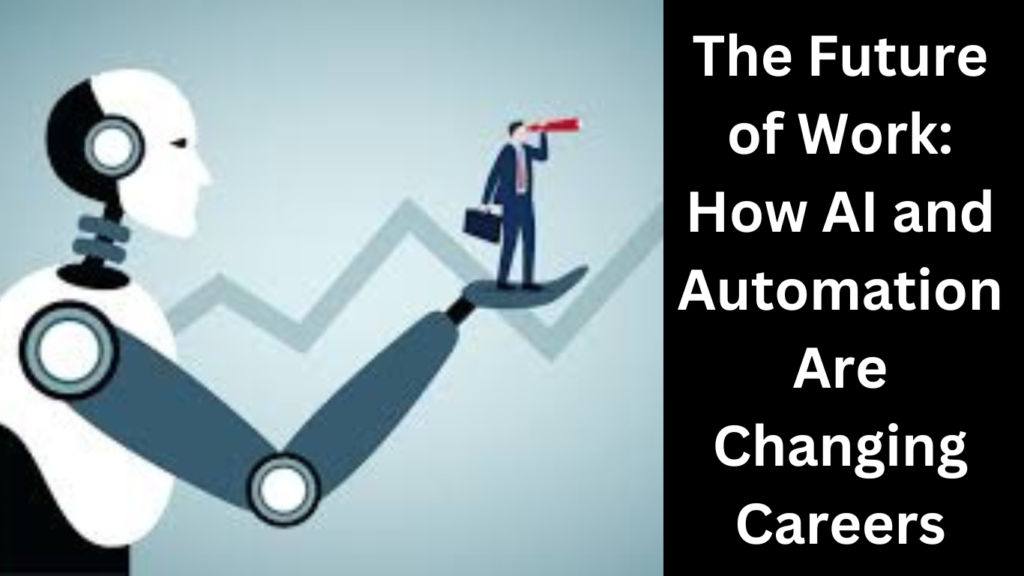The Future of Work: How AI and Automation Are Changing Careers

Introduction
The job market is evolving rapidly, driven by artificial intelligence (AI) and automation. While many fear job losses due to AI, the reality is that new opportunities are also emerging. The World Economic Forum predicts that by 2025, 85 million jobs will disappear, but 97 million new roles will be created. The key question is not whether jobs will exist but whether your job will remain relevant in the future.
This blog explores the future of work, highlighting the most secure careers, the rise of automation, and how you can stay ahead in this rapidly changing job landscape.
The Changing Landscape of Work
Automation and AI are reshaping industries at an unprecedented pace. From self-checkouts replacing cashiers to AI-generated content reducing the need for writers, change is inevitable. The key challenge is adaptability – those who embrace new technology will thrive, while those who resist may find themselves left behind.
Companies are no longer just hiring based on skill but on an individual’s ability to learn, automate, and scale their work. To secure your career, understanding the Skill-Replaceability Matrix is crucial.
The Skill-Replaceability Matrix: Understanding Your Job’s Future
The future of work can be understood using a two-axis matrix:
- Skill Level (X-Axis): The expertise required to perform a job.
- Replaceability (Y-Axis): How easily technology or automation can replace the role.
This creates four distinct quadrants:
- Low-Skill, Low-Replaceability Jobs
- Low-Skill, High-Replaceability Jobs
- High-Skill, High-Replaceability Jobs
- High-Skill, Low-Replaceability Jobs
Let’s analyze each quadrant.
Quadrant Breakdown: Which Jobs Are Safe?
1. Low-Skill, Low-Replaceability Jobs
- Examples: Plumbers, Electricians, Construction Workers, Housekeepers
- Why They’re Safe: Physical labor and human interaction are difficult to automate.
- Risk Level: Low
These jobs are unlikely to be replaced by AI anytime soon, as automation in heavy industries progresses much slower than software-based advancements.
2. Low-Skill, High-Replaceability Jobs
- Examples: Data Entry Operators, Cashiers, Telemarketers, Factory Workers
- Why They’re at Risk: These roles involve repetitive tasks that AI and automation can easily handle.
- Risk Level: High
We are already seeing job losses in this quadrant due to AI adoption. Many companies are replacing low-skilled workers with automated systems and AI-driven solutions.
3. High-Skill, High-Replaceability Jobs
- Examples: Software Developers, Junior Accountants, Junior Lawyers, Graphic Designers
- Why They’re at Risk: AI is becoming proficient in these roles, reducing the need for human intervention.
- Risk Level: Very High
Software engineers are particularly vulnerable because AI tools like GitHub Copilot can write code efficiently. Similarly, legal assistants and accountants face automation in routine tasks. However, the top 1% of professionals in this field are still valuable because they design the systems AI uses.
4. High-Skill, Low-Replaceability Jobs
- Examples: AI Engineers, Senior Software Architects, Surgeons, Strategic Consultants, Top Creators
- Why They’re Safe: These roles require deep expertise, problem-solving, and human intuition that AI cannot replicate.
- Risk Level: Low
These professionals use AI as a tool to enhance their work rather than being replaced by it. They focus on strategy, critical thinking, and innovation, making them highly valuable in the job market.
How AI is Reshaping Different Professions
Software Engineers and AI Engineers
- Software Engineers are at risk due to automation. AI-driven tools are making coding more efficient, reducing the need for entry-level programmers.
- AI Engineers, however, are in high demand as they develop and refine AI systems.
Doctors, Lawyers, and Finance Professionals
- Doctors are mostly safe. While AI can diagnose diseases, human expertise is essential for treatment and surgeries.
- Lawyers and Finance Experts are facing automation in routine tasks like contract reviews and audits. However, top-tier professionals making strategic decisions remain irreplaceable.
Creative Professionals and Content Creators
- AI is already generating content, designing logos, and editing videos. This makes junior creative professionals vulnerable.
- However, the top content creators and designers who build brands and communities are safe, as AI lacks human emotional intelligence.
How to Future-Proof Your Career
1. Use AI as a Tool, Not a Threat
Instead of fearing AI, learn how to use it to your advantage. Tools like:
- ChatGPT, Gemini, and Perplexity AI (for writing and research)
- GitHub Copilot (for coding)
- Sora and MidJourney (for image and video creation)
2. Learn Automation Skills
- Automate repetitive tasks in your job.
- Invest in AI-powered productivity tools to enhance efficiency.
3. Focus on Irreplaceable Skills
Develop skills in:
- Critical Thinking and Strategy
- Emotional Intelligence
- Problem-Solving and Creativity
4. Stay Ahead with Continuous Learning
Industries are changing fast. Keep learning to stay relevant. Online courses, AI certifications, and hands-on experience with AI tools will help future-proof your career.
Conclusion
AI is not eliminating jobs – it’s eliminating tasks. The workers who adapt and use AI effectively will be the ones who thrive in the new job market.
To escape the matrix, stop seeing AI as a competitor. Instead, use it as a tool to automate, innovate, and scale your skills. The future of work belongs to those who embrace change. Are you ready?
FAQs
1. Will AI take my job?
AI won’t take jobs completely, but it will automate tasks. If your job is repetitive, it’s at risk.
2. How can I make my career future-proof?
Use AI as a tool, learn automation, and focus on strategic, high-value tasks.
3. What are the safest careers in the AI era?
AI engineers, surgeons, strategic consultants, and top-tier creatives are among the safest.
4. Should software engineers be worried about AI?
Junior software engineers are at risk, but senior engineers who architect systems will thrive.
5. Can AI replace doctors and lawyers?
AI can assist, but human expertise in making judgment calls is irreplaceable.